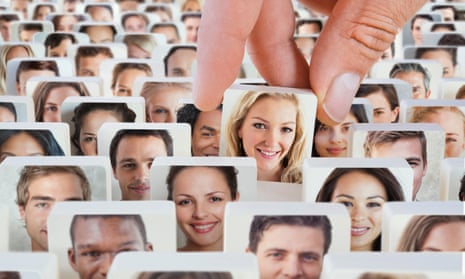If the founders of a new face recognition app get their way, anonymity in public could soon be a thing of the past. FindFace, launched two months ago and currently taking Russia by storm, allows users to photograph people in a crowd and work out their identities, with 70% reliability.
It works by comparing photographs to profile pictures on Vkontakte, a social network popular in Russia and the former Soviet Union, with more than 200 million accounts. In future, the designers imagine a world where people walking past you on the street could find your social network profile by sneaking a photograph of you, and shops, advertisers and the police could pick your face out of crowds and track you down via social networks.
In the short time since the launch, Findface has amassed 500,000 users and processed nearly 3m searches, according to its founders, 26-year-old Artem Kukharenko, and 29-year-old Alexander Kabakov.
Kukharenko is a lanky, quietly spoken computer nerd who has come up with the algorithm that makes FindFace such an impressive piece of technology, while Kabakov is the garrulous money and marketing man, who does all of the talking when the pair meet the Guardian.
Unlike other face recognition technology, their algorithm allows quick searches in big data sets. “Three million searches in a database of nearly 1bn photographs: that’s hundreds of trillions of comparisons, and all on four normal servers. With this algorithm, you can search through a billion photographs in less than a second from a normal computer,” said Kabakov, during an interview at the company’s modest central Moscow office. The app will give you the most likely match to the face that is uploaded, as well as 10 people it thinks look similar.
Kabakov says the app could revolutionise dating: “If you see someone you like, you can photograph them, find their identity, and then send them a friend request.” The interaction doesn’t always have to involve the rather creepy opening gambit of clandestine street photography, he added: “It also looks for similar people. So you could just upload a photo of a movie star you like, or your ex, and then find 10 girls who look similar to her and send them messages.”
Some have sounded the alarm about the potentially disturbing implications. Already the app has been used by a St Petersburg photographer to snap and identify people on the city’s metro, as well as by online vigilantes to uncover the social media profiles of female porn actors and harass them.
The technology can work with any photographic database, though it currently cannot use Facebook, because even the public photographs are stored in a way that is harder to access than Vkontakte, the app’s creators say.
But the FindFace app is really just a shop window for the technology, the founders said. There is a paid function for those who want to make more than 30 searches a month, but this is more to regulate the servers from overload rather than to make money. They believe the real money-spinner from their face-recognition technology will come from law enforcement and retail.
Kukharenko and Kabakov have recently returned from the US, and Kabakov was due to travel to Macau and present the technology to a casino chain. The pair claim they have been contacted by police in Russian regions, who told them they started loading suspect or witness photographs into FindFace and came up with results. “It’s nuts: there were cases that had seen no movement for years, and now they are being solved,” said Kabakov.
The startup is in the final stages of signing a contract with Moscow city government to work with the city’s network of 150,000 CCTV cameras. If a crime is committed, the mugshots of anyone in the area can be fed into the system and matched with photographs of wanted lists, court records, and even social networks.
It does not take a wild imagination to come up with sinister applications in this field too; for example authoritarian regimes able to tag and identify participants in street protests. Kabakov and Kukharenko said they had not received an approach from Russia’s FSB security service, but “if the FSB were to get in touch, of course we’d listen to any offers they had”.
The pair also have big plans for the retail sector. Kabakov imagines a world where cameras fix you looking at, say, a stereo in a shop, the retailer finds your identity, and then targets you with marketing for stereos in the subsequent days.
Again, it sounds a little disturbing. But Kabakov said, as a philosophy graduate, he believes we cannot stop technological progress so must work with it and make sure it stays open and transparent.
“In today’s world we are surrounded by gadgets. Our phones, televisions, fridges, everything around us is sending real-time information about us. Already we have full data on people’s movements, their interests and so on. A person should understand that in the modern world he is under the spotlight of technology. You just have to live with that.”


